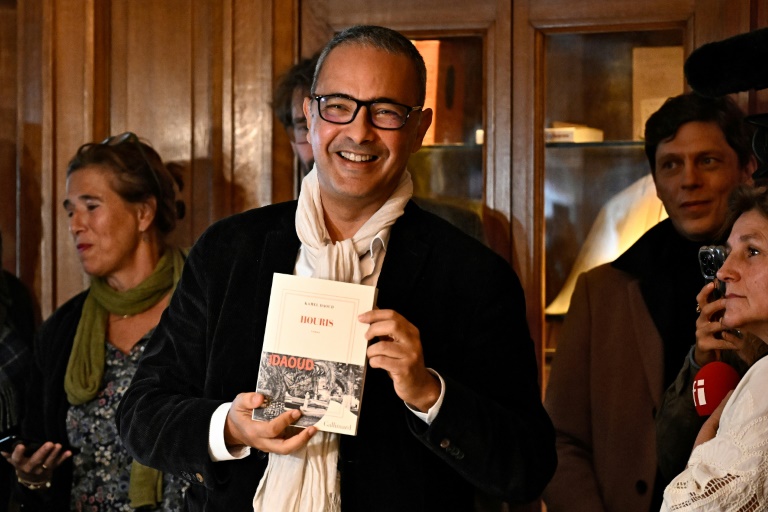Algerian-French writer Kamel Daoud wins top French literary prize
3 min read
Kamel Daoud was awarded the prize for his novel 'Houris' JULIEN DE ROSA

Kamel Daoud was awarded the prize for his novel 'Houris' JULIEN DE ROSA
Algerian-French author Kamel Daoud has been awarded the prestigious Goncourt Prize, one of the most esteemed literary honors in the French-speaking world. Daoud, best known for his first novel The Meursault Investigation, received the recognition for his latest work, Houris, which was chosen by the Goncourt jury on Monday, November 4, during their deliberation at the renowned Drouant restaurant in Paris.
Houris is Daoud’s highly anticipated second novel, and it has quickly garnered attention for its compelling exploration of post-civil war Algeria. The novel follows the journey of Aube, a woman who survives the violence and trauma of the Algerian Civil War, often referred to as the “Black Decade,” which raged from the early 1990s through to the early 2000s. The conflict, which claimed the lives of tens of thousands, remains a deeply sensitive and contentious subject in Algeria, and Daoud’s work confronts its impact head-on.
Set against the backdrop of Algeria’s divided society, Houris explores themes of survival, memory, and the cost of violence on both an individual and collective scale. The novel’s central character, Aube, struggles to reconcile her personal identity and the trauma of the war, navigating a country still grappling with its past. Daoud’s evocative prose and sharp social commentary highlight the fractures within Algerian society, from the devastation of the civil war to the ongoing struggle for political and social reform.
However, while Houris has received widespread acclaim in France, it will not be published in Algeria, Daoud revealed. The novel delves into sensitive subjects such as the country’s history of civil conflict, and due to strict laws in Algeria that criminalize the public discussion of certain aspects of the war, particularly those critical of the state’s handling of the conflict, Houris faces significant censorship in Daoud’s homeland. The legal restrictions surrounding the novel’s themes make its publication there impossible, a stark reminder of the ongoing tension between artistic freedom and state-imposed limits on free expression in Algeria.
Daoud’s victory marks a significant moment in his literary career, following his international success with The Meursault Investigation, a reimagining of Albert Camus’ The Stranger through the eyes of the brother of the novel’s unnamed Arab victim. Houris continues Daoud’s exploration of the complexities of post-colonial identity and the deep scars left by the Algerian Civil War.
In addition to Daoud’s triumph, French-Rwandan author Gaël Faye also received a major literary honor on the same day. Faye was awarded the Prix Renaudot, another of France’s most prestigious literary distinctions, for his second novel, Jacaranda. Faye, who is also a celebrated slam poet and musician, was among the four finalists for the Goncourt Prize. His novel, Jacaranda, continues his exploration of themes related to displacement, war, and identity, reflecting his experiences growing up in Burundi and Rwanda during the turbulent period leading up to and following the Rwandan Genocide.
At 42 years old, Faye’s literary career continues to gain momentum, and his work has been praised for its lyrical prose and profound emotional resonance. Jacaranda weaves a poignant narrative of love, loss, and the search for belonging against the backdrop of a fractured world. His win of the Prix Renaudot further cements his place as one of the most exciting voices in contemporary Francophone literature.
Both Daoud and Faye’s awards reflect the increasing importance of voices from the African diaspora in shaping the global literary landscape. The recognition of Houris and Jacaranda speaks to the growing demand for literature that confronts difficult histories, addresses the legacies of colonialism and conflict, and challenges the boundaries of the French-speaking literary tradition.
As the French literary world celebrates the success of these two authors, the literary achievements of Daoud and Faye highlight the richness and diversity of contemporary storytelling. Their works continue to provoke thought, stir conversation, and deepen understanding of the complex histories and identities that shape the modern world.
With the Goncourt Prize and the Prix Renaudot now both in hand, Kamel Daoud and Gaël Faye are set to continue their literary journeys, bringing powerful and important stories to the global stage.